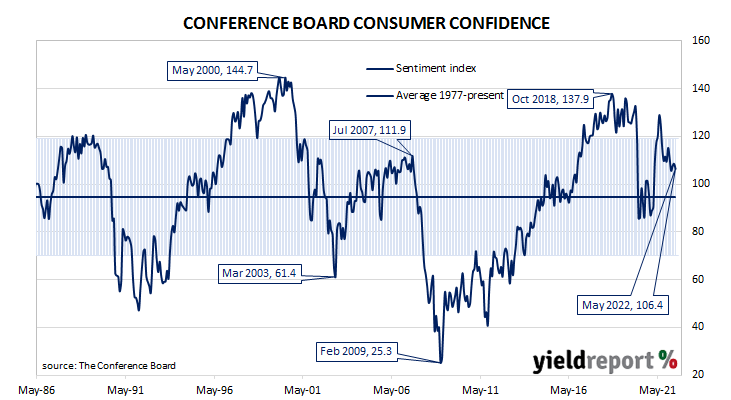Summary: Conference Board Consumer Confidence Index deteriorates in May, higher than consensus expectations; views of present conditions, short-term outlook deteriorate; Present Situation Index at strong level, suggests growth in Q2; Conference Board measure holding up better than UoM gauge.
After the GFC in 2008/09, US consumer confidence clawed its way back to neutral over a number of years and then went from strength to strength until late 2018. Measures of consumer confidence then oscillated within a fairly narrow band at historically high levels until they plunged in early 2020. Subsequent readings then fluctuated around the long-term average until March 2021 when they reached elevated levels. However, a noticeable gap has opened up recently between the two most-widely followed surveys.
The latest Conference Board survey held during the first three weeks of May indicated US consumer confidence has deteriorated slightly. May’s Consumer Confidence Index registered 106.4 on a preliminary basis, higher than the median consensus figure of 103.9 but lower than April’s final figure of 108.6.
Consumers’ views of present conditions and the outlook for the near-future both deteriorated. The Present Situation Index declined from April’s revised figure of 152.9 to 149.6 while the Expectations Index declined from a revised figure of 79.0 to 77.5.
“Overall, the Present Situation Index remains at strong levels, suggesting growth did not contract further in Q2,” said Lynn Franco, a senior director at The Conference Board. “That said, with the Expectations Index weakening further, consumers also do not foresee the economy picking up steam in the months ahead.”
Longer-term US Treasury yields moved moderately higher on the day. By the close of business, the 10-year Treasury bond yield had gained 4bps to 2.85% and the 30-year yield had added 5bps to 3.06%. The 2-year yield finished 1bp lower at 2.56%. In terms of US Fed policy, expectations for a higher federal funds rate over the next 12 months hardened. At the close of business, June contracts implied an effective federal funds rate of 1.08%, 23bps higher than the current spot rate while July contracts implied a rate of 1.40%. May 2023 futures contracts implied 3.015%, 219bps above the spot rate.
“Despite further weakening, the Conference Board measure continues to hold up better than the University of Michigan gauge, which puts more weight on personal financial situation and less on business and labour market conditions,” said NAB economist Taylor Nugent.
The Consumer Confidence Survey is one of two monthly US consumer sentiment surveys which result in the construction of an index. The Conference Board’s index is based on perceptions of current business and employment conditions, as well as respondents’ expectations of conditions six months in the future. The other survey, conducted by the University of Michigan, is similar and it is used to produce an Index of Consumer Sentiment. That survey differs in that it also includes some longer-term questions.


